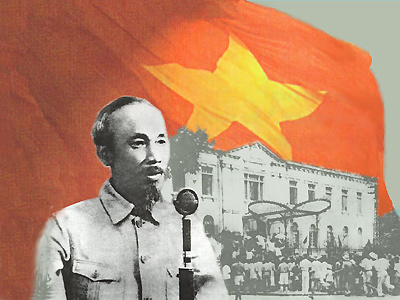Although Lao culture has no customs of setting up altar in their house, many Vietnamese families in Laos still establish an Uncle Ho altar and offer incense regularly. It keeps their young generation always looking toward the homeland and maintains the special feeling of overseas Vietnamese toward the father of the nation.
Ms. Nguyen Thi Nuong, an overseas Vietnamese in Vientiane, Laos, sets up Uncle Ho altar in the best place in her house.
She said that in 1946 her parents left Laos to arrive Thailand to live to create a strong community to support the nation under Uncle Ho’s call. When moving, her family and many other families only brought clothes but not Indochinese piaster because it couldn’t be spent in Thailand. When landing in Thailand, their lives were very difficult but all families tried to seek an image of Uncle Ho, even cut from newspaper to set up his altar.

Documentary photo
Explaining why they set up an Uncle Ho altar when he still lived, Ms Nuong said that all Vietnamese people loved, respected and followed his advice because thanks to Uncle Ho, we have independence and Fatherland today.
They chose the most solemn place in their houses to set up Uncle Ho’s altar. When Uncle Ho was healthy, Vietnamese people didn’t offer incense but they offered flowers and fruits or food on the first, fifteenth days of every lunar month, Uncle Ho’s birthday or National Day to invite him and wished him good health.
According to Ms. Nuong, although the local country banned setting up the altar, they didn’t fear. When the police checked, they hid Uncle Ho’s photo. If they didn’t conceal it in time, they said that was their ancestors’ photo.
In 1966 Ms. Nuong moved to France to live, she put Uncle Ho’s photo in her luggage. In 1969 when hearing Uncle Ho passed away, she found a large photo of Uncle Ho to replace the small one she brought with from Thailand and set up Uncle Ho’s alter in her house.
In 1976 when leaving France to return to Laos to live, she brought the photo to worship Uncle Ho to now. For her, the photo is very precious.
Born in 1958 in Northeastern Thailand when his parent moved to Thailand from Laos under Uncle Ho’s call in 1946, the impression, love and affection for Uncle Ho of Mr. Nguyen Duc Sau, 62, in Sikhottabong district, Vientiane, have not faded.
When he was about 6 years old, he usually saw his parents offer flowers and fruits to Uncle Ho’s altar and explained that he was a great person of the Vietnamese people and he didn’t get married and sacrificed all his life to the nation to help the people be wealthy and happy.
Mr. Sau said that not only his family but many Vietnamese families in Nong Khai province, Northeastern Thailand, also established Uncle Ho altars.
When going to school, he also learned about Uncle Ho. On Uncle Ho’s birthday or the National Day of Vietnam, he was presented candy of Uncle Ho.
In 1977, his family returned to Laos to live, he couldn’t set up Uncle Ho’s altar because he had to rent a house to live. In 1990, his family bought a small house and he set up an Uncle Ho altar and worshipped him until now.
He always tells his children and grandchildren about Uncle Ho’s sacrifice and moral example, and has asked his children to remember Uncle Ho’s merit and preserve Uncle Ho’s altar.
The hearts of Ms. Nuong and Mr. Sau show special feelings of the majority of overseas Vietnamese for President Ho Chi Minh, the old father of the Vietnamese nation.
In addition, the overseas Vietnamese community in Laos also devotes their land to join hands with the governments of the two countries to build a commemoration area for Uncle Ho in Xieng Vang village, Kham Muan province, where Uncle Ho did revolutionary activities in 1928-1929.
Over the past time, under Uncle Ho’s teachings, the Vietnamese community in Laos has been a bridge for Vietnam-Laos relations, toward the homeland and preserving good cultural traditions for the young generations./.